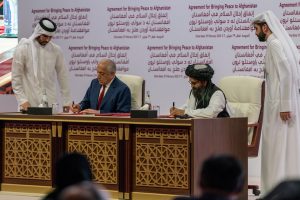In a ceremony in Doha, Qatar, on Saturday, the United States and the Afghan Taliban signed an agreement that will begin a process that could culminate in the end of the U.S. military presence in Afghanistan and movement toward a political transition process between the Afghan government and the Taliban.
Mullah Abdul Ghani Berader, a senior Taliban political official and one of the group’s co-founders, signed the agreement alongside Zalmay Khalilzad, the U.S. special envoy for Afghanistan reconciliation. Representatives from 26 countries attended the signing ceremony. Afghan President Ashraf Ghani attended and witnessed the signing.
The deal marks the culmination of negotiating efforts that began in the second half of 2018 between the U.S. and the Taliban, without the direct involvement of the U.S.-backed Afghan government. Saturday’s signing came after the two sides implemented a reduction of hostilities to set the stage for the signing.
The core bargain at the center of Saturday’s deal is that the United States and its allies will leave Afghanistan fully in 14 months if the Taliban cut ties with terrorist groups hostile to the west like al-Qaeda. The U.S. invaded Afghanistan in December 2001 after the September 11, 2001, attacks, which had been carried out by al-Qaeda terrorists who had been harbored by Afghanistan’s Taliban government.
Saturday’s agreement was dubbed an “agreement for bringing peace” to Afghanistan, but does not mark a comprehensive agreement on the country’s political future. The signing of the agreement comes amid an ongoing political dispute between Ashraf Ghani, the winner of the most votes in Afghanistan’s September 2019 presidential elections, and Abdullah Abdullah, Ghani’s former unity government partner as chief executive officer.
If the U.S.-Taliban agreement is successfully implemented, the Taliban would then begin negotiations with the Kabul government that would ideally lead to a process by which the group’s leaders could participate politically in governing Afghanistan. Negotiations on that process have yet to begin; as long as the post-election political disagreements between Ghani and Abdullah persist, it is unlikely that talks can begin.
Speaking after the signing of the agreement on Doha on Saturday, U.S. President Donald J. Trump suggested that violations of the agreement by the Taliban could lead to a return to Afghanistan by the United States. U.S. troops will be immediately reduced to 8,600 from around 12,000 in the coming weeks.
Per the text of the February 29 declaration, the U.S. “will complete the withdrawal of their remaining forces from Afghanistan within 14 months… and will withdraw all their forces from remaining bases.” The reduction to 8,600 must happen in 135 days from the signing.
“I really believe the Taliban wants to do something to show that we’re not all wasting time,” Trump said on Saturday. “If bad things happen, we’ll go back,” he added. Trump also said that he would seek a meeting with senior Taliban officials and implied that the group would undertake counterterrorist operations. “I’ll be meeting personally with Taliban leaders in the not-too-distant future, and will be very much hoping that they will be doing what they say,” Trump said. “They will be killing terrorists. They will be killing some very bad people. They will keep that fight going.”
U.S. Secretary of State Mike Pompeo, who was in Doha for the signing, warned that the agreement’s value would depend on implementation. “The agreement will mean nothing—and today’s good feelings will not last—if we don’t take concrete action on commitments stated and promises made,” Pompeo said.

































